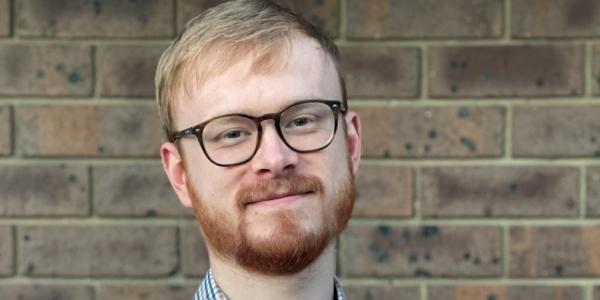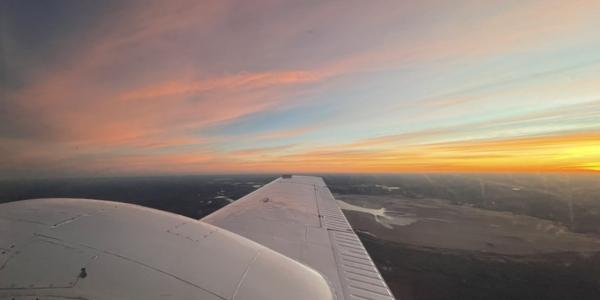2:0min

This story was created and shared by Optometry Victoria South Australia (OV/SA).
After graduating from Flinders University in 2018 with a Master of Optometry, South-Australian optometrist Sam Hobbs set his sights on exploring the broad spectrum of opportunities the profession has to offer.
Sam has been to quite a few places in his relatively short time as an optometrist. During his studies he spent time working in rural SA, VIC, NSW, and WA, as well as remote Nepal, and since graduating he’s worked independently in remote Western Australia, Adelaide, and rural and remote South Australia. He won the ACO’s Outstanding Graduate Award, was published in Experimental Eye Research, and has also presented on the topic of myopia control at OVIC/SA’s SRC Mini Conference.
Despite his wide travels around Australia, Sam’s life actually began in England. He spent his childhood and most of his schooling near London, until his parents made the decision to move to Adelaide when he was seventeen.
“I probably would have stayed in England if I’d been able to financially support myself when my family moved. The thought of leaving your friends and family behind at that age is rough, but looking back on that decision now, I have absolutely no regrets and love it here.”
Sam now practices full scope optometry at Adelaide Eyecare for most of the week, including complex lens fittings and myopia control, but you can also find him teaching at Flinders University on Mondays and Fridays. Once or twice a month Sam also performs outreach work in regional areas like Coober Pedy, Port Augusta, or even the remote APY lands, which involves flying to Alice Springs and then taking a charter flight in to run Optometry clinics for Aboriginal and Torres Strait Islander patients for a few days at a time.
Optometry Victoria South Australia (OV/SA) sat down with Sam to hear about his thoughts on his time so far, his advice to new optometrists, and what’s next.
OV/SA: You’ve done a lot of work in remote communities. What prompted you as a new graduate to look for optometry work outside the city?
SH: Starting out, I really wanted to throw myself in the deep end and see as much as possible in terms of patient variety. Going out to work in remote WA seemed like just the thing to scratch that itch. When you’re working in areas where there’s only ever 1 or 2 Optometrists to a town of 20,000 people, the weird and wacky eyes pretty much always find their way to your chair.
It was great to be in that environment, and it felt good to be fostering strong relationships with other professionals like the local pharmacists, GP’s, and hospital doctors. There’s no denying it came with a fair share of stress, but I felt like it paved the way for so much growth, and at such a rapid pace as well. I look back at that 2 years and think it may have been the best thing I could have done for my career as a whole.
I really wanted to be in a role where I could dive in and grow quickly. Working in an area with no regular ophthalmologist meant that I ended up diagnosing and co-managing some pretty interesting cases. From optic nerve avulsions to rare white dot syndromes – I was Iucky enough to be seeing all sorts! I remember doing my first membrane peel just weeks out of uni and feeling equal parts excited and stressful, but it was this sort of trial by fire that made me really love what I was doing.
When you’re the only “eye person” in the town, you just have to buckle up and learn how to fix and manage these things. These are patients who don’t have another option and need help, and that really motivates you to step up and do everything you can to provide the best possible care. You learn fast in these environments because you have that added responsibility to your patients, they’re relying on you. It’s such a rewarding feeling when you get to be that person and give that care. It was exactly what I was looking for in a job.
OV/SA: What are you passionate about in optometry?
SH: It sounds cliché, but I’m really passionate about making positive change. I also really love having variety. I’m someone who gets bored if I’m not being challenged, and I love having the opportunity to be creative when problem solving for my patients. Being able to combine those two things to genuinely improve a patient’s quality of life is why I love what I do.
Affecting positive change is so rewarding and it’s driven me each step of the way in my career. After working remotely, I moved to a practice called Adelaide Eyecare. We do lots of custom hard contacts, as well as complex cases and a lot of myopia control. What I love about this environment is having the opportunity to make even bigger differences. Giving a keratoconic patient 6/6 vision with lenses for the first time in their life feels amazing, and you really do feel like you’re making a big difference.
Outreach work is similar. Providing services to communities without access to proper care is a great way to use our skillset for a lot of good. Often this care may just be refractive, but sometimes it’s the simple solutions that can make the biggest of differences.

One of the things I love about teaching at the Uni is that you can incite passion with your own passion. Seeing that lightbulb moment when a student understands a tricky concept for the first time is awesome, nothing beats it. To an even greater degree I like to think that when a great course influences entire classes of young graduates, your capacity to affect change becomes even more widespread at a community level.
OV/SA: What would you suggest to optometry students and new graduates?
SH: My biggest recommendation to students is to do as many rural placements as possible in your last year of study. It makes for some great experience and really vaults your confidence as well as your personal growth as a student.
To new graduates? I’d say don’t be afraid to throw yourself in the deep end a little. It’s surprising how important the first couple of years of proper practice can be when it comes to your early career, and starting with a big leap can often mean that other career steps don’t seem so scary.
I feel like that short two years of practicing remotely has counted for so much more and given me the confidence to take bigger jumps earlier on in my career. It’s not just the optometry skills, either. Moving interstate and living in a completely new town was a big task, and there’s a lot of personal growth that happens along the way.
OV/SA: What are your hopes for the future of optometry?
SH: My biggest hope would be to see the scope of practice continue to expand. It would be great to see the politics between medical bodies taking a backseat, and patient care taking the only seat. Minor laser procedures, orals, intra-vitreals – these are all things that in the right setting and with the right training can be better utilised to serve our communities far more effectively, be that remote or metro.
I’d love to finally see our potential as clinicians be properly utilised. There’s a lot more we can be doing, and while there’s no doubt we’re moving in the right direction, it can sometimes feel like we move at a frustratingly slow pace.
In saying that, seeing new collaborative care initiatives and increasing optometry presence in hospital and ophthalmological settings gives me a lot of hope, and I really am excited to see what the future of this profession holds.
Tagged as: adelaide eyecare, APY Lands, flinders, sam hobbs